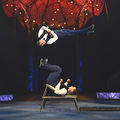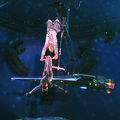Anastasini Family
From Circopedia
Acrobats, Jugglers, Animal Trainers, Circus Owners
The Anastasini family is an ancient Italian dynasty of traveling entertainers whose origins are difficult to track. The circus line began in the nineteenth century, when Sidonia and Antonia, the daughters of an Italian circus owner, married the brothers Luigi and Girolamo Biasini—from another family of Italian traveling entertainers. Together they created Circo Anastasini in 1877. The choice of that name, however, remains unclear since Biasini should have been the obvious choice; it may have been related to Sidonia and Antonia's family: there was an Anastasini active in the late 1800s as an equestrian, and in all probability, he was Sidonia and Antonia's brother. But that doesn't mean it was their actual family name.
It is therefore not easy to track the lineage of the Anastasinis of the twentieth century: Like all Italian circus families, they married into several other circus families. The story of the first Circo Anastasini is also difficult to document, and it seems that it disappeared towards the end of the 19th century. However, another Circo Anastasini was created in 1910 by Luigi Biasini, and remained active until the end of WWII.
Yet the Anastasinis acquired a good reputation as performers in Italy and Europe, independently from the circus that bore their name. Over the years, there have been hand-balancers, jugglers, and acrobats performing under that name. Among them, Renato Anastasini was a diabolo juggler whose sons Luciano and Giovani created a renowned Risley actAct performed by Icarists, in which one acrobat, lying on his back, juggles another acrobat with his feet. (Named after Richard Risley Carlisle, who developed this type of act.). In the 1960s, Renato also performed with his wife, Betty, and his son Luciano in a well-known musical clown act, the Anastasinis, and Betty presented a comedy "camel" act, with her sons in the "skin" of a fancy camel.
The "American" Anastasinis
Renato and his family went to the United States in 1980 to perform with Circus Vargas, then the country's largest traveling circus under canvas. Giovanni and Luciano did their Risley actAct performed by Icarists, in which one acrobat, lying on his back, juggles another acrobat with his feet. (Named after Richard Risley Carlisle, who developed this type of act.), and they also performed with their parents in the family's diabolo act. The Anastasinis eventually settled in the United States, and continued to perform in various American circuses. In time, Luciano and Giovanni parted, Luciano creating a rambunctious dog act, with which he was featured notably with Ringling Bros. and Barnum & Bailey and the Big Apple Circus, and Giovanni created a spectacular rotating-cradlePiece of apparatus (generally aerial) composed of two horizontal parallel bars in which a catcher locks his legs to be in position of catching a flyer. (Variant: Korean Cradle.) act with his wife, Irene España, which was also featured at the Big Apple Circus (2014-2015)—among many other venues in the United States.
Giovanni also continued his father's tradition, maintaining the family's diabolo act which he performs today (as of 2015) with his wife and his sons, Giuliano and Fabio—who, in turn, have created their own Risley actAct performed by Icarists, in which one acrobat, lying on his back, juggles another acrobat with his feet. (Named after Richard Risley Carlisle, who developed this type of act.) under the guidance of their father; they ninth-generation Anastasinis. As for Giovanni and Luciano, they have not completely gone their separate ways: Together they produce shows for corporate and special events, and for punctual dates, with their own Circus Anastasini.
See Also
- Video: Luciano Anastasini, Dog Act, at the Big Apple Circus (2008)
- Video: The Anastasini Brothers, Risley act, at the Big Apple Circus (2014)
- Video: Giovani Anastasini & Irene España-Anastasini, rotating aerial cradle, at the Big Apple Circus (2014)
- Video: The Anastasinis, diabolo act, at the Big Apple Circus (2014)



